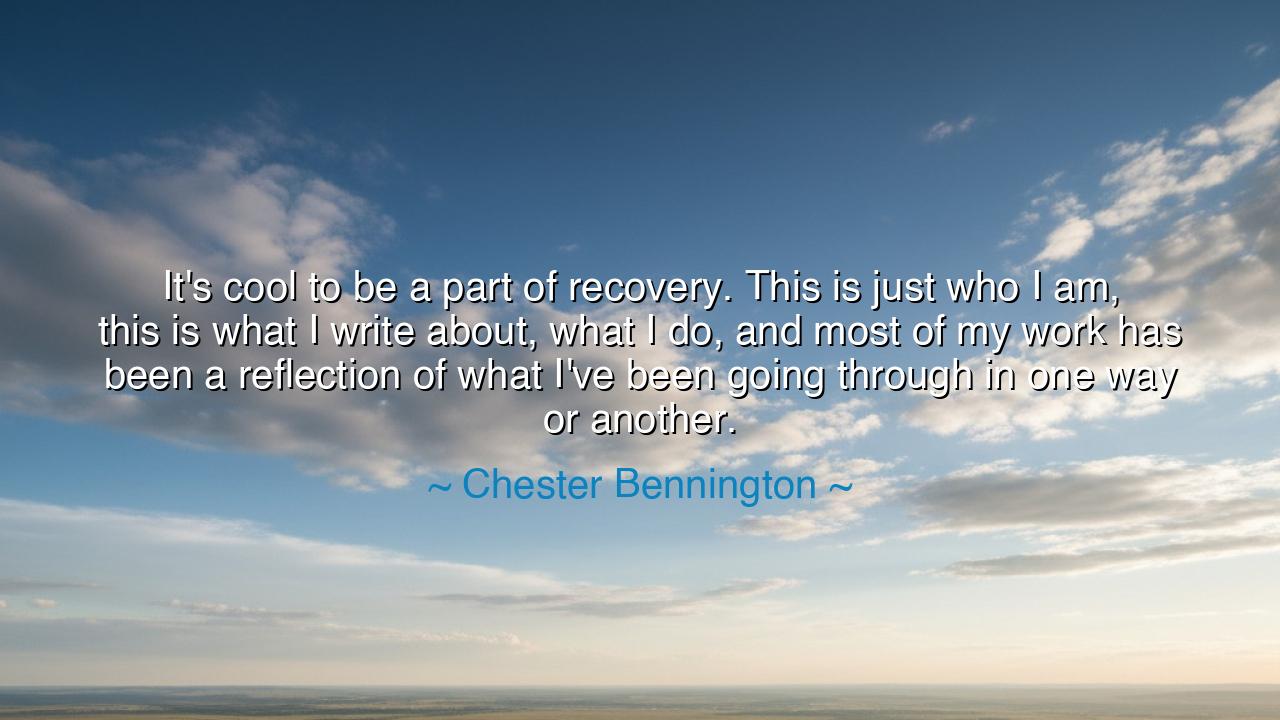
It's cool to be a part of recovery. This is just who I am, this
It's cool to be a part of recovery. This is just who I am, this is what I write about, what I do, and most of my work has been a reflection of what I've been going through in one way or another.






In the ancient wisdom of the world, we find that the path to healing is not a solitary journey, but a universal experience that connects us all. The words of Chester Bennington, "It's cool to be a part of recovery. This is just who I am, this is what I write about, what I do, and most of my work has been a reflection of what I've been going through in one way or another," echo the profound understanding that the act of recovery is not a weakness, but a powerful testament to the strength of the human spirit. To be open about one’s struggles, to reflect upon them, and to transform them into something meaningful is one of the highest callings an individual can answer.
In the ancient traditions, heroes were not those who avoided suffering, but those who overcame it. Hercules, the mighty Greek hero, was not born with strength; his greatest feats were achieved through struggle and endurance, and through the transformation of his challenges into opportunities for greatness. He faced trials that seemed insurmountable, yet each test refined him, and through each victory over adversity, he grew stronger. Chester Bennington’s openness about his own journey of recovery mirrors this ancient understanding: true strength is found not in the absence of struggle, but in the courage to face it and to heal from it. Just as Hercules' labors became his defining achievements, Bennington’s struggles became the heart of his work and his legacy.
The great philosophers of antiquity, such as Socrates and Plato, spoke of the importance of self-examination and personal growth. Socrates famously said, "The unexamined life is not worth living." This reflects the wisdom that our struggles, our pains, and our triumphs are not to be hidden away but examined and understood. Chester Bennington did not shy away from his pain; instead, he made it his truth, weaving it into the very fabric of his art. By sharing his vulnerabilities, he invited others to do the same, creating a space where healing could take place not only for him but for countless others who were listening. In this way, Bennington's work became not just music, but a reflection of his journey and a path to recovery for those who shared his struggles.
The story of David in the Bible offers another example of this journey from suffering to strength. David, a young shepherd, was chosen not because he was free from fear, but because he faced his fears with courage. His fight against Goliath is the ultimate testament to the belief that we do not find our greatness in avoiding hardship, but in how we face it. David’s journey was filled with moments of doubt, pain, and loss, yet it was through these experiences that he grew into the leader who would unite a nation. Similarly, Chester Bennington’s journey was not just about overcoming personal demons; it was about sharing his vulnerability with others, making his story relatable and his recovery inspirational.
Chester Bennington’s words also resonate with the wisdom of Buddha, who taught that suffering is a natural part of life, but that it is our response to suffering that determines our fate. Buddha’s path to enlightenment was one of deep self-reflection, mindfulness, and ultimately release from the grip of suffering. In much the same way, Bennington’s art was a way of confronting his pain and using it to find meaning and purpose. To make one’s suffering the focal point of their art is not an act of weakness, but of bravery. By transforming pain into something beautiful and meaningful, we not only heal ourselves but offer that healing to others.
The lesson Chester Bennington offers us is a lesson in courage and transformation. Recovery is not a linear path, and it is not a path one walks alone. By acknowledging our struggles and embracing them, we allow them to become part of our story, and through this storytelling, we find our strength. Healing comes not from hiding our wounds but from accepting them and using them to build a life of authenticity and purpose. Just as Chester Bennington channeled his personal recovery into his music, we too can find ways to transform our struggles into sources of strength and inspiration.
And so, let us carry forward this ancient wisdom: our struggles are not what define us, but how we respond to them. Let us embrace the journey of recovery with open hearts and minds, knowing that each step, no matter how difficult, is a step toward growth and healing. Like the heroes of old, we do not find our true strength in perfection, but in our ability to rise from the ashes of our pain and to share our story with the world. In doing so, we not only heal ourselves but also offer others the hope and courage to do the same.






AAdministratorAdministrator
Welcome, honored guests. Please leave a comment, we will respond soon